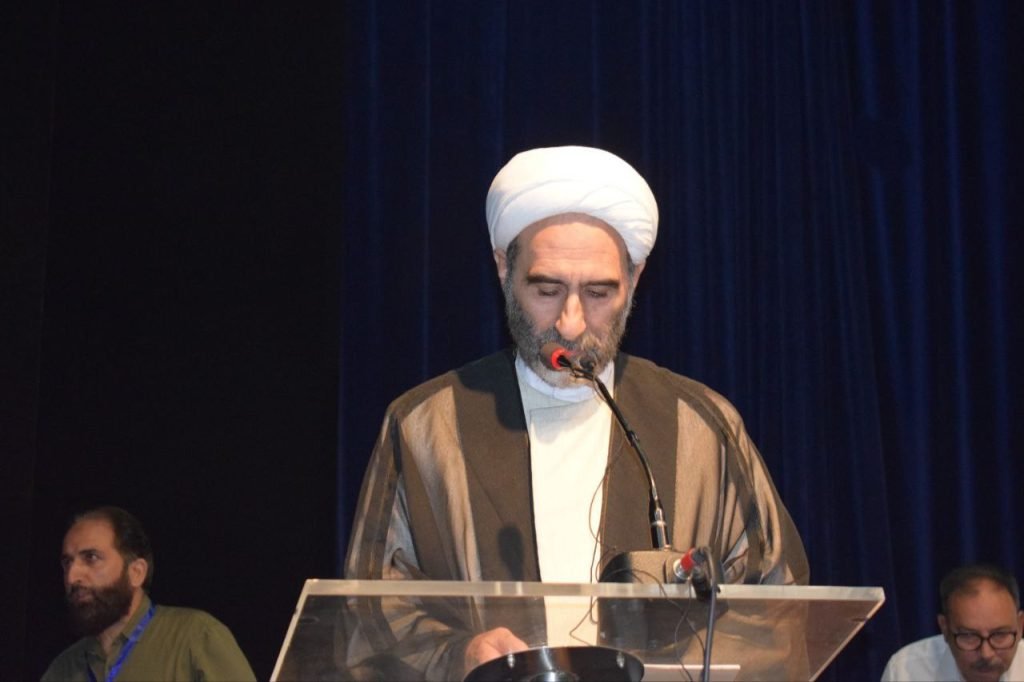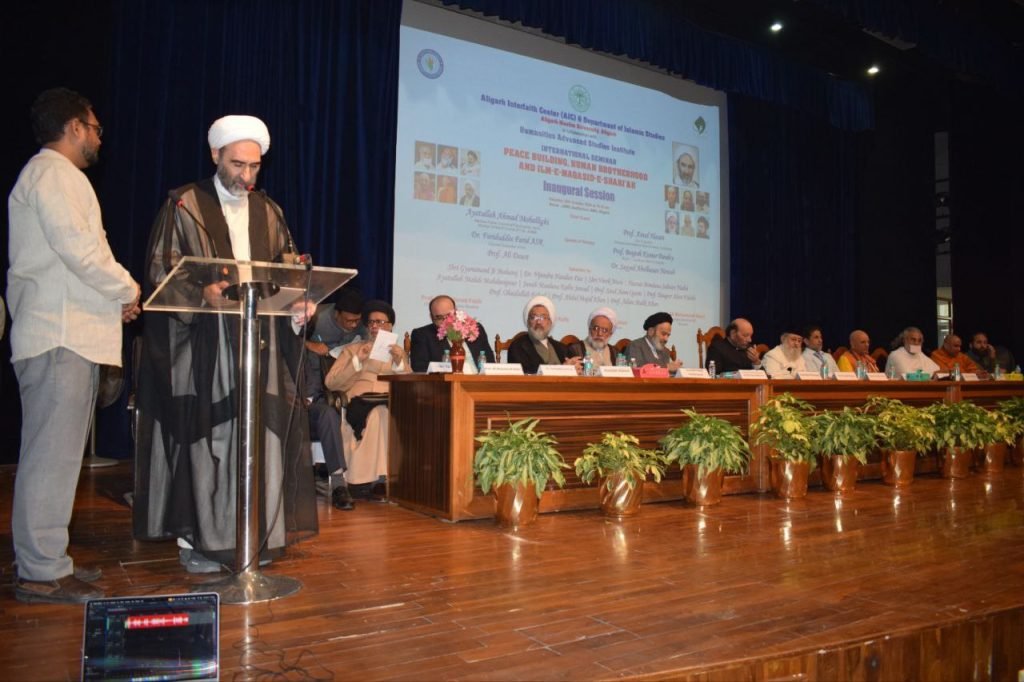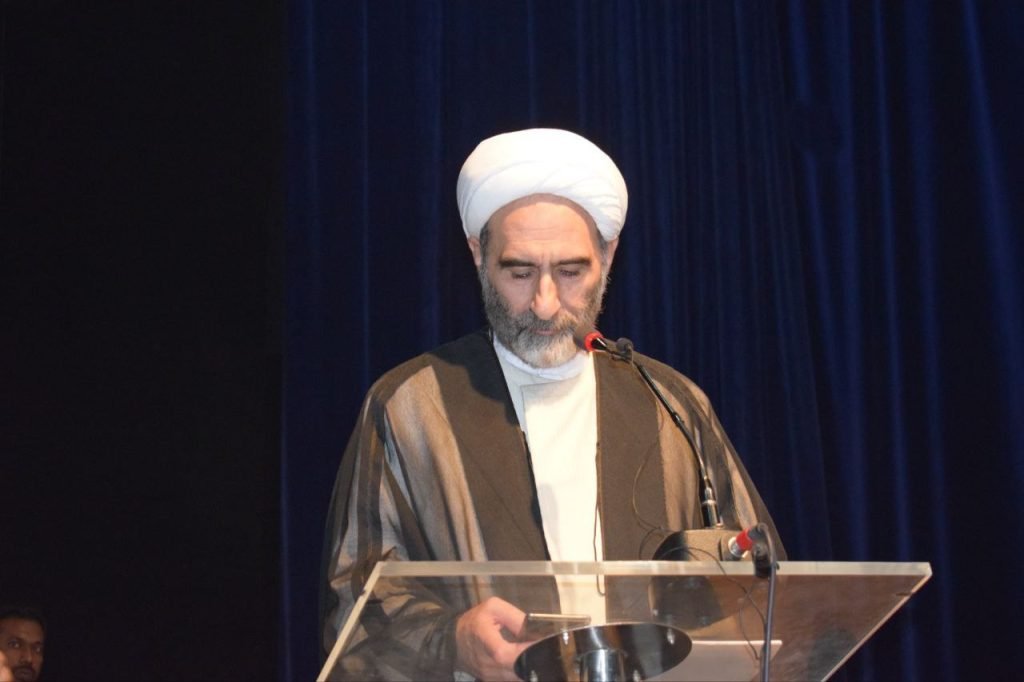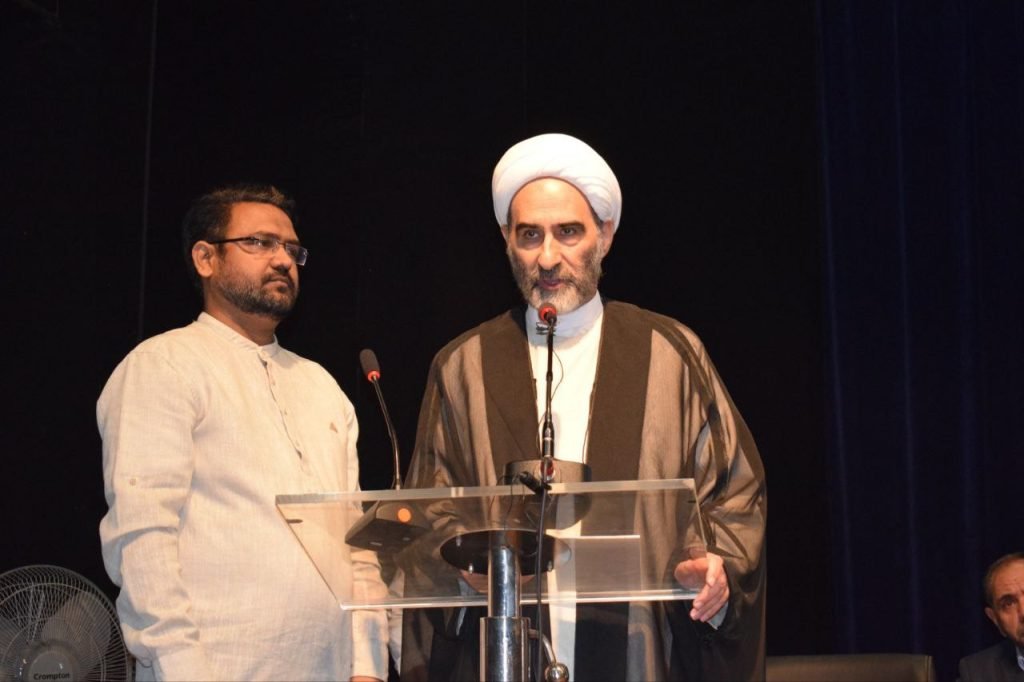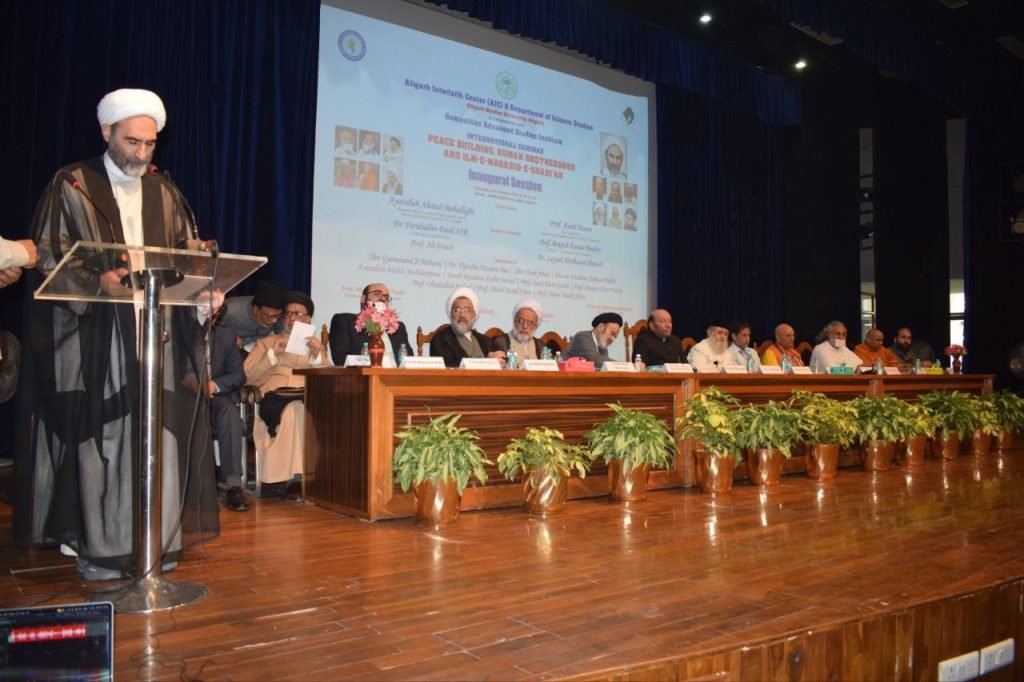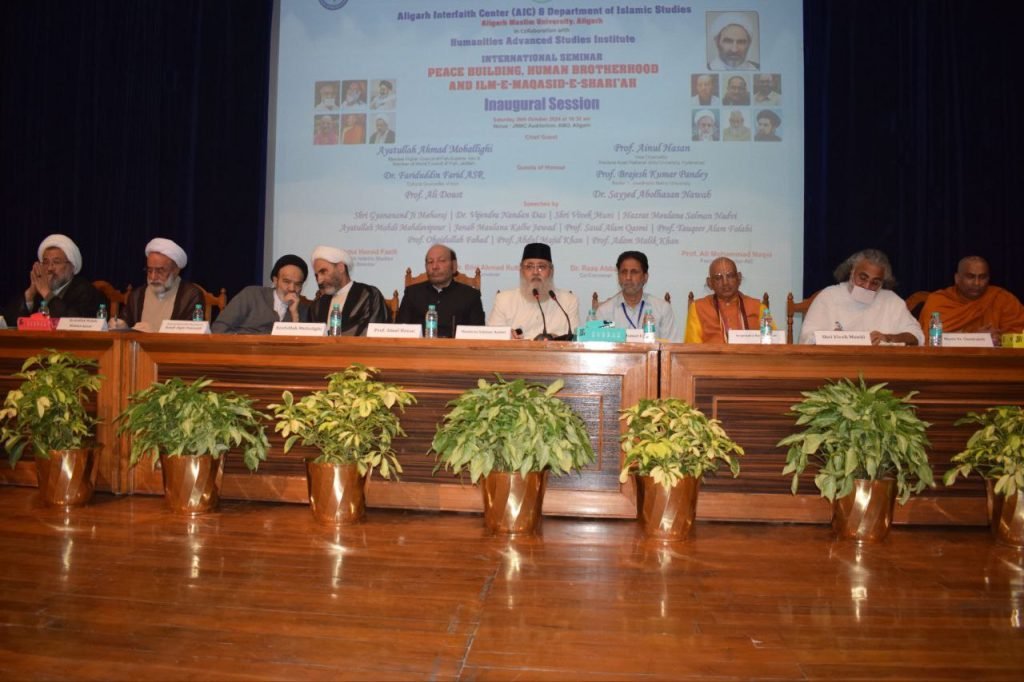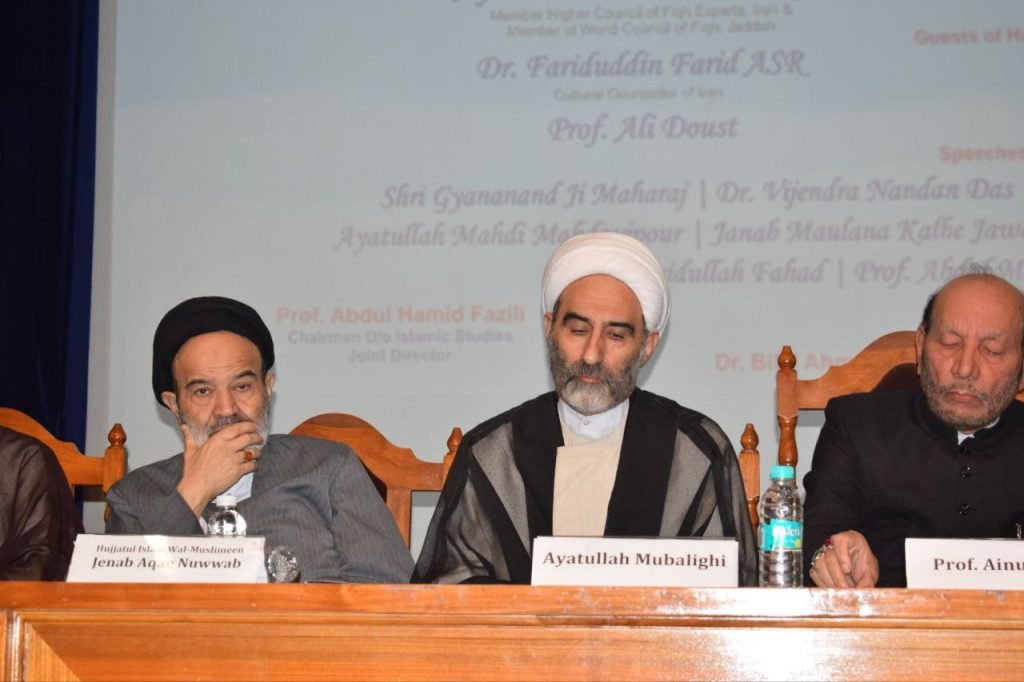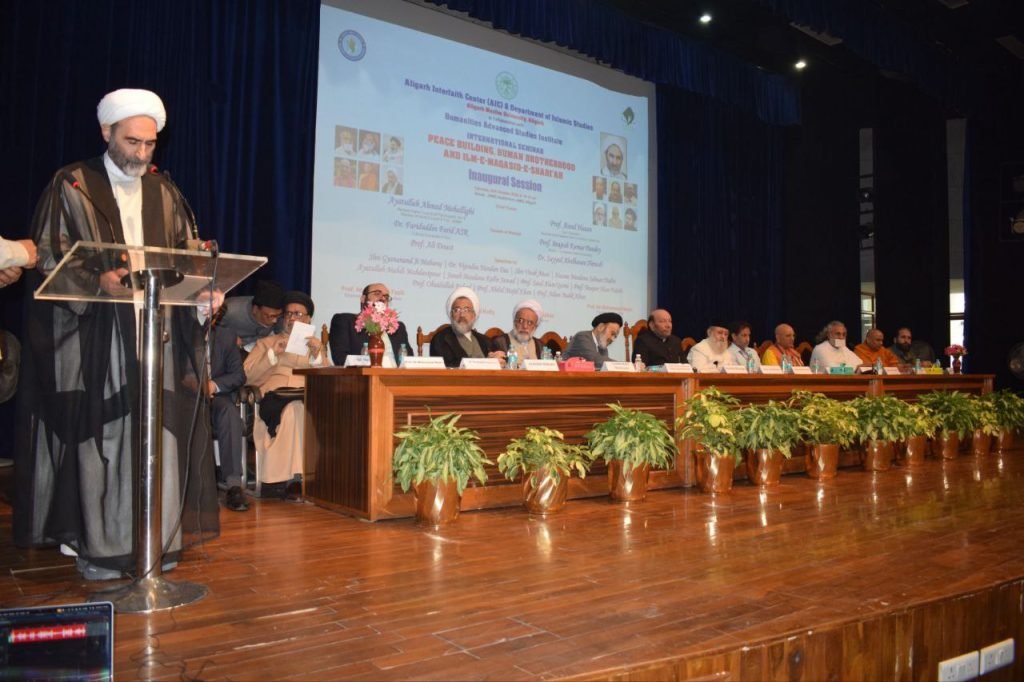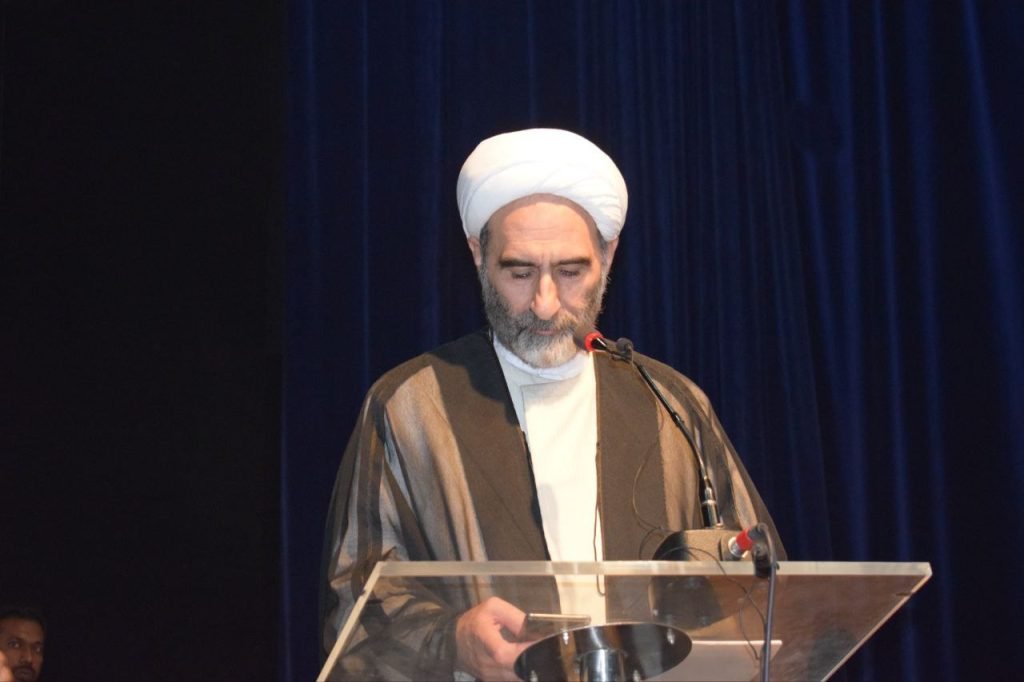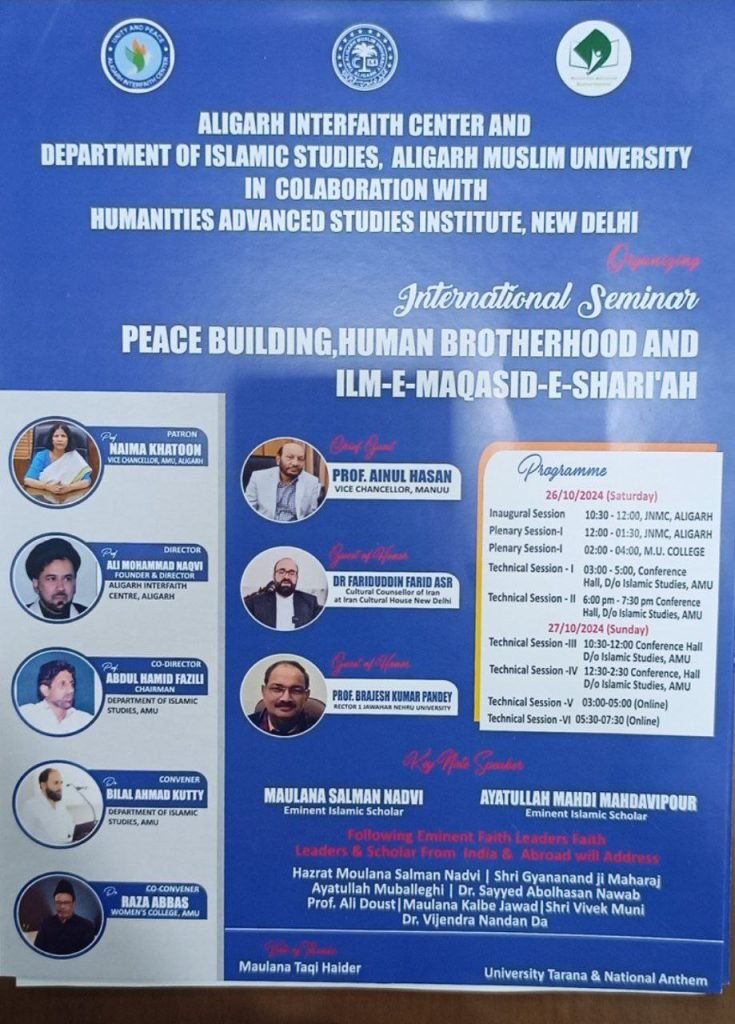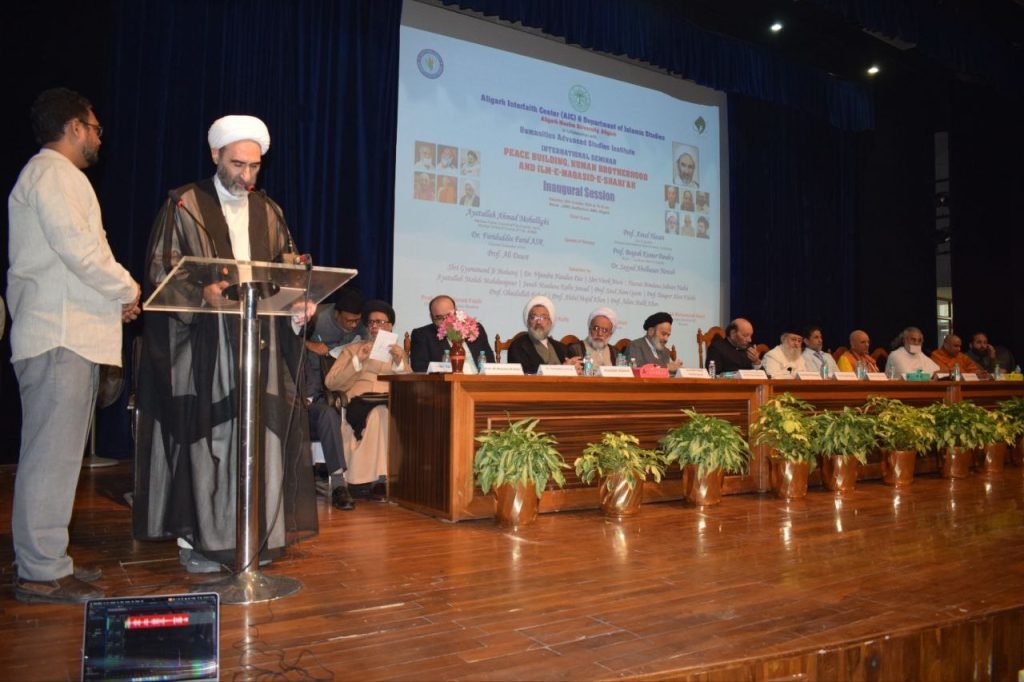
On October 26, 2024, Aligarh Muslim University (AMU) hosted a significant international seminar on “Peacebuilding, Human Brotherhood, and the Knowledge of Maqasid al-Sharia (Higher Objectives of Sharia),” co-organized by AMU’s Interfaith Center and Department of Islamic Studies in collaboration with the Humanities Advanced Studies Institute (HASI), New Delhi. The event aimed to bring together renowned religious leaders, scholars, and intellectuals from diverse schools of thought and religious backgrounds to promote interfaith harmony and underscore the importance of peace and brotherhood in today’s global context.
Opening Session: Vision for Peace and Brotherhood
The seminar opened with a recitation from the Holy Quran, symbolizing the theme of peace and unity. Professor Ali Mohammad Naqvi, the founding director of AMU’s Interfaith Center, welcomed the audience in his keynote address. He described the gathering as a timely initiative aimed at fostering mutual respect and peaceful coexistence among followers of different faiths. Professor Naqvi noted that the modern world is marked by social and political tensions, making interfaith dialogue not just a benefit but a necessity. He emphasized that the objective of the seminar was to provide a platform for discussion on religious values that promote justice, humanity, and ethical conduct.
Key Messages from Distinguished Speakers
The seminar featured influential scholars and leaders who presented perspectives on how religious teachings can guide society towards unity and harmony.
- Hazrat Maulana Syed Salman Husaini Nadvi discussed the central theme of humanity in Islamic teachings. He highlighted how Islam, through its emphasis on compassion, respect, and peaceful coexistence, provides guidance on building a harmonious society. Maulana Nadvi emphasized that lasting peace could only be achieved if individuals embrace humanity and fraternity as core values, respecting others regardless of faith or background.
- Ayatollah Mahdi Mahdavipour, the Representative of Iran’s Supreme Leader in India, presented a profound perspective on ethics and justice in Islam. Quoting from the teachings of Imam Zain al-Abidin, he discussed how the pursuit of justice and ethical integrity could serve as pillars for societal peace. He urged the audience to consider peace not just as an outcome but as a process rooted in daily interactions, anchored in the principles of respect, fairness, and compassion.
- Shri Gyannand Ji Maharaj, a renowned Sanatan Dharma scholar, emphasized the foundational role of love and respect in Indian philosophy. Drawing on Hindu teachings, he spoke of “Vasudhaiva Kutumbakam” (the world as one family) and urged followers of all religions to adopt this principle. By seeing each individual as part of a larger family, he noted, we can foster a peaceful and interconnected global community.
- Ayatollah Muballagi from Qum, Iran, elaborated on the concept of Maqasid al-Sharia, or the higher objectives of Islamic law, which focus on human welfare, justice, and moral values. He explained how these principles provide a framework for building a just society, and emphasized the responsibility of religious leaders to promote ethical conduct, support societal harmony, and ensure justice.
- Prof. Dr. Sayyed Abul Hasan Nawwab, Founder of the University of Religions in Qum, Iran, discussed the Islamic vision of brotherhood, urging unity among all believers. He emphasized the importance of fostering peace and friendship across different religious communities, stating that interfaith dialogue can bridge gaps, resolve misunderstandings, and cultivate respect.
- Professor Ali Doust, an Islamic scholar from the Shia Islamic Seminary in Qum, Iran, stressed that human welfare lies at the core of Sharia’s objectives. He discussed how Maqasid al-Sharia promotes educational and social development, which are essential for a prosperous and harmonious society.
- Dr. Fariduddin Farid Asr, the Cultural Counselor of Iran in India, highlighted the significance of Islamic teachings in promoting social justice, humanity, and fraternity. He explained how values such as compassion and fairness are integral to Islamic ethics, and how these values can guide people toward better relations with others.
- Shri Vivek Muni, a respected Jain leader, focused on the Jain principle of “Ahimsa” (non-violence) and “Live and Let Live,” which he described as essential for interfaith harmony. He advocated for mutual respect and called for dialogue among different religious communities to create a peaceful and cooperative society.
- Dr. Vijendra Nandan Das, a Hindu preacher, emphasized self-realization and character development as highlighted in the Bhagavad Gita. He encouraged individuals to seek spiritual growth as a pathway to peace, stating that one’s character and integrity significantly impact society at large.
- Professor Naima Khatoon, Vice Chancellor of AMU, discussed the role of education in promoting social development. She highlighted those educational institutions have a responsibility to instill values of peace and cooperation in students, who in turn can contribute positively to society.
- Professor Abdul Hamid Fazili, Head of AMU’s Department of Islamic Studies, examined the emphasis on social justice in Islamic teachings, describing it as a fundamental component of human welfare. He noted that service to humanity is integral to Islam’s message, promoting kindness and justice as values that benefit society.
- Dr. Bilal Ahmad Kutty, an Islamic scholar, underlined the importance of mutual respect among religions and cultures. He called for tolerance and understanding, noting that every faith has contributions to make toward societal peace and cohesion.
- Dr. Raza Abbas, Professor at AMU’s Women’s College, provided insights on the pursuit of social justice based on Islamic values. He called for a focus on shared human principles, asserting that such a foundation could strengthen unity among people of different beliefs.
- Professor Ainul Hassan, a distinguished academic, stressed the need for intercultural and interfaith dialogue, highlighting it as the solution to many contemporary conflicts. Drawing examples from global tensions, he argued that dialogue can prevent misunderstandings and encourage peace.
Closing Recommendations and Resolutions
The seminar concluded with a joint declaration highlighting the need for collaborative efforts to promote peace and welfare. Participants agreed on the importance of interfaith dialogues as a vehicle for harmony, emphasizing the responsibility of religious leaders and scholars to advocate for justice, compassion, and peace. Key resolutions included:
- Publication of Research Papers: The seminar’s research papers will be compiled and published, making these insights accessible to the public and academic circles.
- Interfaith Collaboration Initiatives: The organizers and participants resolved to continue fostering interfaith collaborations and to organize similar events that promote mutual respect and understanding.
- Educational Outreach Programs: The role of educational institutions in promoting interfaith harmony was highlighted, with a recommendation to develop programs that instill values of peace, respect, and dialogue in students.
The seminar was widely regarded as a successful initiative, bridging gaps between communities and advancing the ideals of peace, understanding, and unity among diverse faith traditions. Through discussions on the higher objectives of religious teachings, this event underscored the transformative power of knowledge, dialogue, and compassion in building a more peaceful world.
